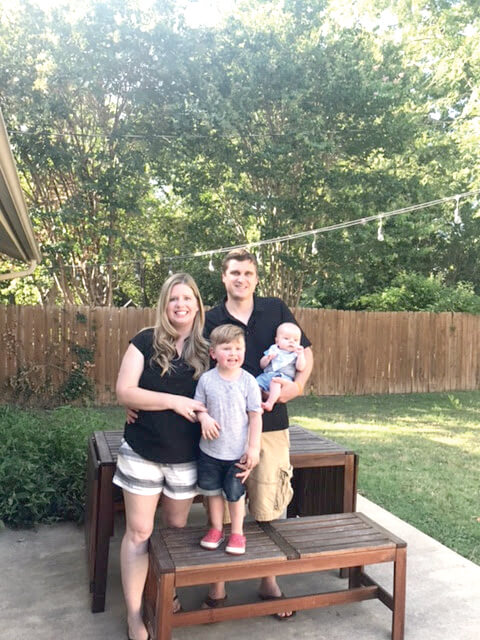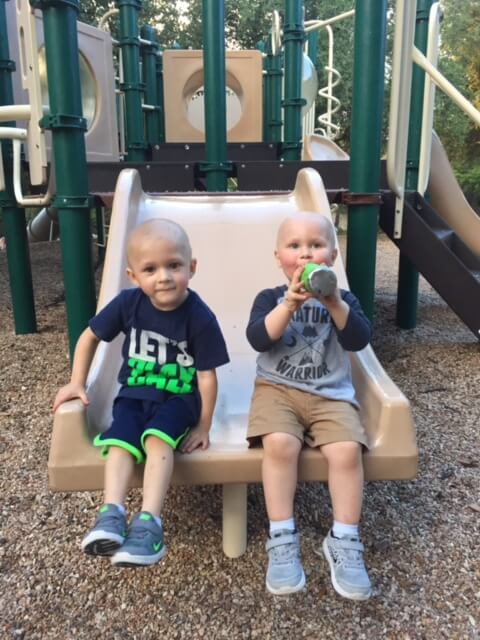
Kevin and Lauren Foltermann in a recent family photo with Archer, 3, who had his last leukemia treatment in June, and their latest addition, Nate, who was born in May.
By SARAH DOOLITTLE
Four Points News
Archer Foltermann looks like a normal, lively three-year-old. According to his dad, Kevin, “He 03wants to go outside and play as soon as he wakes up and he enjoys his cartoons and toys… He is 100 percent boy, runs circles around us (and) is absolutely the happiest kid we know.”
Just over two years ago, however, on June 14, 2015, Archer was diagnosed with a childhood cancer, acute lymphoblastic leukemia (ALL), that due to his age was considered to be highly aggressive, with a survival rate of just 30-40 percent.
As his mom Lauren describes, there were few symptoms to alert her and Kevin to the seriousness of Archer’s disease. She’d been planning the 10-months-old’s birthday party when, “We thought Archer looked pale and then he started bruising on his legs. He was still playing and acting normally, but I decided to make an appointment for blood work.”
Before that appointment, Archer developed a fever and his parents took him to an urgent care clinic after hours. Doctors decided that, since they had a lab on-site, they would go ahead and perform the blood work. Tests revealed a highly elevated white count as well as depleted platelets (which allow blood to clot) and hemoglobin (which carry oxygen in the blood).
Doctors informed the family of Archer’s test results and had them transported immediately via ambulance to Dell Children’s Medical Center of Central Texas. His white count indicated leukemia, so the oncologist on-call was expecting them when they arrived.
Once there, “They immediately began to work on him. He was screaming and we had to hold him down so they could start IVs and get more blood to confirm his diagnosis,” said Kevin. Blood tests confirmed the ALL diagnosis and thus began the family’s two year saga.

Archer Foltermann (right), of Steiner Ranch, with a friend he made during leukemia treatment, Hunter Manwill. Hunter, who lived in Steiner a while, was receiving treatment at Dell Children’s Medical Center of Central Texas for spindle cell rhabdomyosarcoma. Hunter’s cancer was very rare and he passed away on March 2, 2017.
“Our entire life would be forever changed that day,” said Lauren.
She and Kevin remember calling out-of-town family with the news and listening, with tears, as doctors explained the nature of Archer’s disease and his course of treatment.
The hospital placed a broviac line in Archer’s tiny body the next day, which would allow chemotherapy drugs to be delivered directly to Archer’s bloodstream without the need for constant injections.
His chemo started with, “one year of intense systemic and intrathecal combination chemotherapy followed by another year of maintenance (low dose) chemotherapy. Leukemia has one of the longest treatment plans and is usually two to three years long depending on diagnosis,” according to Lauren.
While saving his life, the chemo drugs also took a toll on Archer’s health: his lost all the hair on his body (including his eyelashes); got mouth sores and continued to have low platelets (which could cause internal bleeding in the event of a fall); lost his appetite and at times had to receive nutrients through a feeding tube; and was at constant risk of infection due to his compromised immune system.
All while trying to living the life of a normal little boy still learning to walk and talk. Archer stayed at Dell for a total of 103 days that first year, and while hooked up to his IV, “It was difficult to keep him entertained and distracted. He was so young and did not understand why we were doing this to him,” Lauren said. “Archer had good days where he wanted to play and he would have bad days where he just wanted to be held and slept.”
One thing that helped the family to survive was the relationships they formed with other families also having their children treated at Dell for pediatric cancers. While family and friends provided vital support, it could still be difficult for them to understand. Lauren and Kevin were both grateful, “to have someone else who understood exactly what we were going through. We were all in this cancer club together. None of us wanted to be in the club but we were happy to have each other.”
They were grateful, too, when the first year of intensive treatment finally ended and they could continue the second year at home, completing his final treatment a couple of months ago on June 17.
“Archer completing the initial two years of treatment is a tremendous milestone,” explained Lauren. His hair has grown back and, “His smile and his laugh can make you forget about everything else around you,” said Kevin.
However, she explains that not only will he have, “routine checkups for the rest of his life,” he is also still at risk of long-term side-effects from the chemo, including damage to his organs or cognitive and fertility issues. Lauren adds that Archer is, “also at a higher risk for secondary cancers.”
Still, the family knows how much worse it could have been. One of their most poignant memories from Archer’s two years in treatment is of a little boy they met, Hunter Manwill, whose great aunt and uncle coincidentally lived across the street from the Foltermanns. Hunter ended up moving to Steiner to get treatment at Dell but sadly passed away on March 2, 2017 at the age of 3.
After their long, hard fight, Lauren and Kevin want others to be more aware of pediatric cancers.
“Only 4 percent of federal funding goes to childhood cancer research. Eventually we will all be touched by this horrible disease in some way, if not yet, then somehow, someday,” Lauren said. “Don’t wait until it’s your child to help find a cure.”
To that end, the family encourages others to donate to pediatric cancer research. (St. Baldrick’s Foundation is the only organization whose donations go solely to pediatric cancer research. The Broe family in River Place, who lost their son Pierce to cancer in 2014, have hosted a local St. Baldrick’s over the past several years.)
Besides St. Baldrick’s and Dell Children’s, the Foltermanns named the many organizations that helped them during Archer’s treatment including Dell Children’s Blood & Cancer Center, Battle For A Cure Foundation, Loving Libbie Memorial Foundation, CareBOX Program, Jaxon’s FROG Foundation, Haleycurls for Hope, Super Kooper, B.I.G. Love Cancer Care, and the Jennifer Wilks Foundation.
Although as Lauren said, “We cannot officially say Archer is a survivor until he goes another five years without any signs of leukemia,” the family is moving forward and enjoying life without cancer treatments.
Archer became a big brother when Lauren gave birth to a second son, Nate, on May 22. The family now knows how quickly life can turn on a dime, and it’s a lesson they will not soon forget. As Lauren explained, “It made us both step back and realize what is important in life.”

